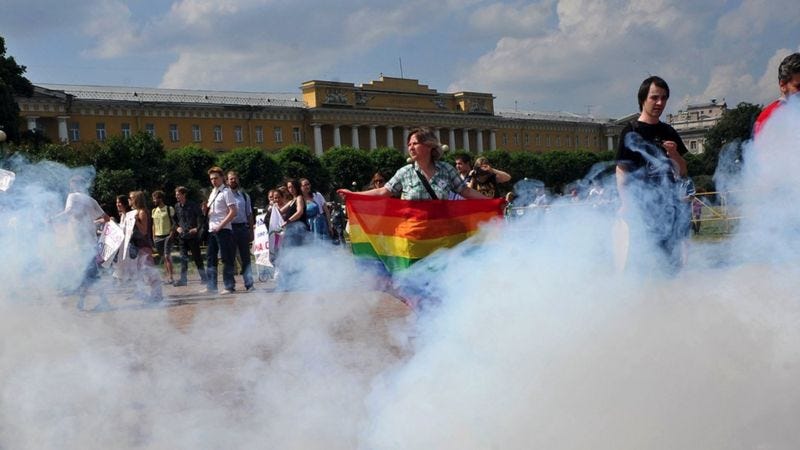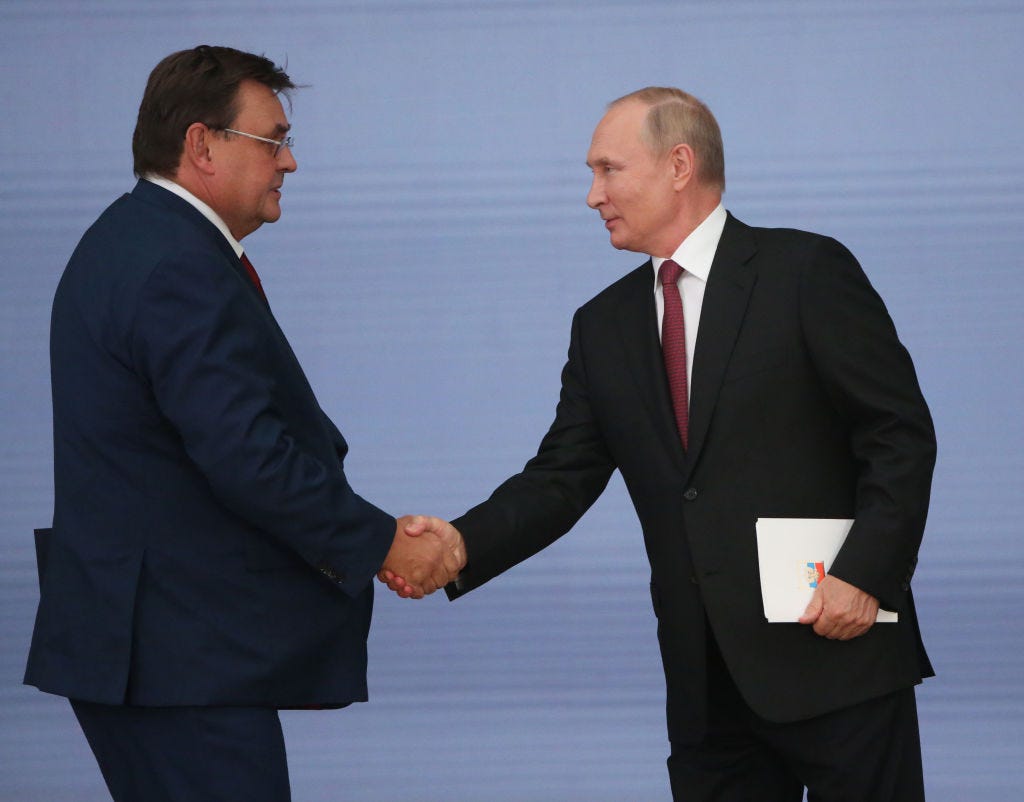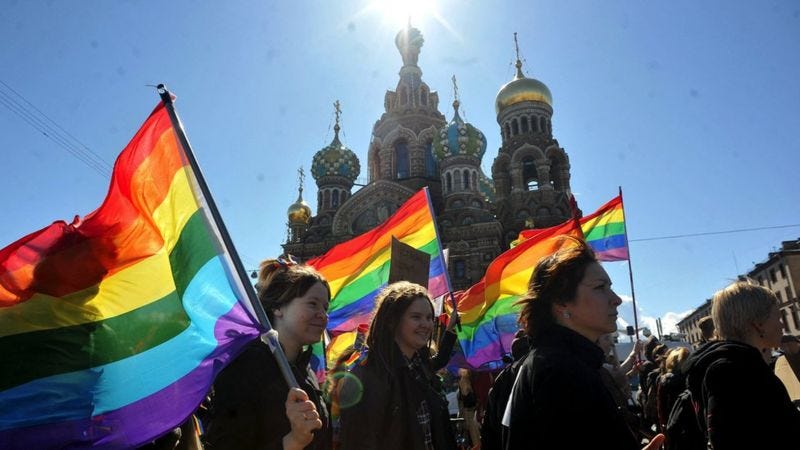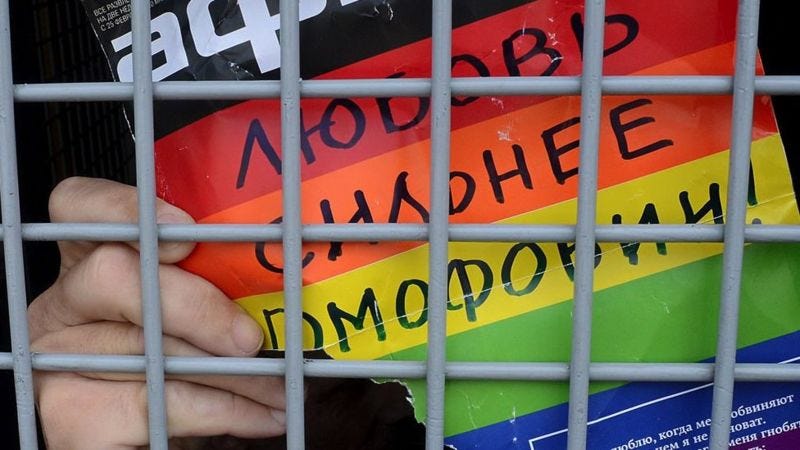“Easy targets” and “gay propaganda”— the grim fate of LGBTQ+ people in Russia today
This pride month, the BBC has been looking at how Russia’s notorious “gay propaganda” law forced an LGBTQ+ couple to flee the country.
By Anastasia Golubeva.

According to human rights activists Russia’s state sanctioned persecution of the LGBTQ+ community has risen sharply during the full-scale invasion of Ukraine. Amidst the backdrop of war and growing ideological confrontation with the West, Russian politicians have been gradually tightening the countries notorious “gay propaganda” law.
So called “Gay propaganda aimed at minors” has been banned since 2013, but in 2022 the law was updated to cover any material that could be deemed to be promoting homosexuality, as well as “propaganda of sex-change and paedophilia.”
With the law increasingly being used to deport foreign nationals from Russia and “gay propaganda” prosecutions increasing in general, the dissolving and dismantling the civil rights of LGBTQ+ citizens seems to increasingly be the direction of travel from the Russian state.
During this global Pride Month The BBC reports on the rise of state backed homophobia in Russia, and how the lives and rights of LGBTQ+ people are being made increasingly more and more uncertain.
“It was like a public flogging”
“What happened to us was like a public flogging for Russia’s whole LGBTQ+ community. They really made an example of us – this is what will happen to you, if you speak out about yourselves,” 23-year old Gela Gogishvili tells the BBC. The case of Gela and his boyfriend, 21-year old Chinese national Xui Haoyang, has been one of the highest-profile prosecutions of LGBTQ+ people in Russia in 2023.
Gela and Xui lived in Kazan, and kept a video blog about their everyday life as a young gay couple. In early 2023 they started receiving threats from homophobic activists who had publicly complained about their blog. Gela said that these threats began in December 2022, after the new “gay propaganda” law came into force. Whilst the earlier legislation only covered content aimed at minors, anything about their LGBTQ+ lifestyle could now be seen as “propaganda” in Russia.

In April, Gela and Xui were arrested for promoting “gay propaganda” on their blog after being denounced by an unnamed individual from Novosibirsk.
As Xui Haoyang was a Chinese citizen, the court ruled to detain him and then deport him from Russia. Whilst Xui was serving his seven-day sentence, lawyers warned Gela that the couple could face the further charge of “spreading pornography,” and that it might be dangerous for him to stay in Russia.
So Gela took his cat and one suitcase and got on a flight to Istanbul. Human rights activists bought Xui a ticket to Beijing, with a flight transfer in Armenia, from there he joined Gela in Istanbul. Xui said he was afraid to return to China, as Chinese officials had accused him of damaging relations with Russia.
Gela and Xui say they don’t plan to return to Russia and that Turkey feels like a much freer country to them. When asked why Russian law enforcement singled them out, Gela replies: “Because we aren’t Russian.”
“I’m Georgian, even though I was born in Russia; and he’s Chinese – a foreigner. It all came together – nationalism, homophobia, xenophobia. They like to say that there are no gays in Russia. They think it’s something brought in from abroad,”.
According to Gela, his story played right into the hands of the authorities. The LGBTQ+ community was shaken, with some even contacting the couple, blaming them for “advertising themselves.”
“This word “advertising” really irritates me. If a straight couple share a picture of themselves holding hands, people think it’s sweet. And when we do it, it’s [treated as] gay propaganda…it isn’t like we were running through the streets, shouting: it’s so great to be gay, be gay! Really, it was like a public flogging,” says Gela.
BBC is blocked in Russia. We’ve attached the story in Russian as a pdf file for readers there.
It affects everyone
Since the beginning of the invasion, Russian authorities have stepped up their anti-LGBTQ+ rhetoric. Human rights activists have noted that the legislation is moving towards interfering with the private lives of certain social groups, and fully revoking their rights and privileges.
“When authoritarian regimes are engaging in military action they tend to strengthen their hold over the private lives of their own civilians,” argues Ksenia Mikhaylova, a lawyer for the LGBTQ+ rights group “Vykhod” [Exit] which is now recognised and treated as a foreign agent in Russia.
According to Mikhaylova, the state’s discrimination and homophobia was previously confined to “restricting certain public activities,” and an LGBTQ+ person who kept themselves to themselves would usually be left alone. Now however activists note that this discrimination is creeping ever more into people’s private lives and work spaces.
“The new laws brought in on December 5th didn’t only affect LGBTQ+ activists. They affected everyone,” says Vladimir Komov, a lawyer for the group “LGBTQ+ Matters.”
Whilst earlier “gay propaganda” laws used arguments about protecting children or public health, the war led to a definite shift. Now the rhetoric emphasis more and more on “the state system and national security,” Komov says.
At the end of last year, state Duma deputies openly stated during a debate that the tightened laws were connected to Russia’s “special military operation” in Ukraine, and the war against “western values.” According to lawmakers, the LGBTQ+ community violates “Russian traditions” and is a product of such “western values.”
“They are constantly looking for an internal enemy,” says Komov, commenting on the logic of the Russian authorities.
The new law on “gay propaganda” was debated in the latter half of 2022. At the time Russian officials mainly focussed on the need to ban – or withdraw from circulation – books and other material about same-sex relationships. The authorities particularly hated a book called “Summer in Pioneer’s Tie” a story about a romance between two Young Pioneers. the books publishers were prosecuted as soon as the law was passed.
Elsewhere Western TV series were also censored. The Russian streaming platforms “Mediateka” and “Kinopoisk” uploaded separate versions of “Game of Thrones,” “Euphoria,” “The White Lotus,” “Sex and the City” and other shows which featured scenes of same-sex relationships. Some shows were pulled from the sites entirely.
Online, websites and social media forums belonging to LGBTQ+ groups and individual bloggers have been blocked in Russia. And in early 2023, the authorities moved from simply censoring to actively targeting groups.
Hunting for foreigners
The latest trend in the hard-line “gay propaganda” legislation involves targeting foreign citizens and then deporting them.
In particular there is a special paragraph about foreign citizens in the new law, which will hit one of the most vulnerable groups – sex workers from neighbouring countries.
Mediazone were the first organisation to draw attention to the change. Using public court records, they discovered that Moscow police had carried out internet swipes in January 2023, identifying a sex site which hosted the profiles of trans-women. In their report, police wrote that sex-workers “of the male gender” had posted pictures with altered appearances and female clothing, “publicly declaring their interest in non-traditional relationships.”
On the Moscow court’s website there were six reported charges of “gay propaganda” against foreign defendants between December 2022 and February 2023. Consequently four sex-workers were deported from Russia. The remaining court-records weren’t published, but it is likely that the outcome of those cases was the same.
In a similar case in April of this year, police targeted foreign sex-workers in Krasnodar. The local police force carried out internet monitoring, allegedly finding “information about the provision of sexual services as propaganda for non-traditional relations.” Subsequently, they arrested four trans-women, including two from outside Russia.
Both foreigners were accused of “spreading gay propaganda to minors” and deported; the two Russian citizens were charged under an article relating to prostitution.
In April a German citizen was deported from Kamchatka for using a gay dating app. The court’s website claims the foreigner was “imposing a perspective on non-traditional relationships and preferences.” State media covered the case: Russian government funded TV channel RT reported that the man was working in Russia as a German language teacher, and was meeting other men via the dating app. Certain messages were used as evidence that he’d promoted the “desirability” of LGBTQ+ relationships: “Being gay is allowed” he’d written, and “It’s sad, this need to separate people based on what they do in bed – that should be something private.”
It’s unclear how the authorities apprehended the German national, but he was fined 150,000 roubles and deported.
“The wording of the current legislation shouldn’t technically allow the state to get involved in any private or professional LGBTQ+ matter – running a gay club, printing ads about dating, or even sex-work,” argues lawyer Ksenia Mikhaylova.
In her view, online ads convey information that a person is prepared to enter a homosexual relationship – but don’t necessarily impose a “positive impression” on the reader.
“Nevertheless, there is no end to the ways these laws are interpreted. The LGBTQ+ community is not just an easy target, but a helpless target – there is no chance they can follow the letter of the law. Because the law is incomprehensible. The wording is already vague, and in practise matters become even more confusing,” says Mikhaylova.
Trans-people labelled “scammers”
With the new legislation including a ban on “sex-change propaganda,” it is becoming ever clearer to activists that trans-rights in Russia are increasingly being eroded.
Already two high-ranking Russian officials have brought in anti-trans initiatives. Aleksandr Bastrykin, chief of the Investigative Committee, described people who have switched their gender category on their legal documents as “scammers.”

“Changing gender on paper – that’s a deception, it’s fraud. And where there’s fraud, there’s a violation of the interests of the state, our defence capability. I’m talking about the people who tried to change genders to dodge mobilisation,” said the Bastrykin, noting that future investigations would consider “the new reality.”
The Minister of Justice, Konstantin Chuychenko, said he was in favour of “treatment” for transgender people, promising to tighten the legal process around changing gender. Chuychenko proposed that trans individuals wanting to change their gender on documents would only be able to do so post-surgery.
“My view – the view of the Ministry of Justice – is that people should be treated in the way nature intended,” said Chuichenko.
“What the Minister of Justice is suggesting – it’s an interference with a person’s private life, with their own body,” argues “Vykhod’s” lawyer, Ksenia Mikhaylova. “The state isn’t just interested in how a person socialises, in how they present their external self. They want to know about their body. And what could be more private than the body?”
There have been multiple arrests under the “gay propaganda” law this year in connection with trans issues, says lawyer Vladimir Komov. In addition to the criminal cases against trans sex-workers, men have been charged after being photographed in skirts or dresses.
Otherwise, trans-women have been denounced and charged with talking to someone about their identity, says Komov.
LGBTQ+ people and the war
“A third of Russians identifying themselves as LGBTQ+ face violence or discrimination” recorded "Vykhod,” in a 2022 survey. One in five people were threatened with outright violence, with the number rising to one in three among trans people.

Recent surveys of the LGBTQ+ community suggest Russia has become more transphobic and more homophobic since the invasion of Ukraine began. Most people connect this shift to the rhetoric of officials and pro-government media, although 40% add that their closest relatives had also become more susceptible to homophobia.
A third of people said they’d had difficulty accessing essential medicines during the war, with half of trans people reporting shortages.
16% of those surveyed – around a thousand LGBTQ+ people – said they had fled Russia after the beginning of the war, or after mobilisation. 80% of this group had been until then living in Moscow or Petersburg.
Interviewees in “Vykhod’s” survey of regional LGBTQ+ activists noted that the outbreak of war had led to a “loss of community.” Many LGBTQ+ organisations were forced to go into hiding or close down, after facing the scrutiny of law-enforcement.
Whilst general discrimination remains the same as in 2022 it is officials who are now driving the latest wave of homophobia and transphobia in Russia. Such trends remain concerning, say human rights activists.
“In Russia there is hardly ever a public demand for one government policy or another. There’s a lack of structure to Russian civil society. Sometimes the public mood follows government rhetoric, but the government rhetoric or policy seldom reacts to the public mood,” remarks Ksenia Mikhaylova.
Mikhaylova believes that opportunities for change were missed in 2013. This was when Russia entered a more acute phase of confrontation with the West, adopting its first “gay propaganda” law.
“If society had turned around and rejected the trend at this point...[and] refused to denounce people, express homophobic sentiments, then I doubt we’d be seeing the levels of rampant homophobia that came in with the invasion [of Ukraine]. The early homophobic policy became the cradle for the policies we’re seeing now, which cannot be ignored anymore.”
Read this story in Russian here.
Translated by Pippa Crawford.
English version edited by William Edelsten.
Here is the film about Gela and Xui (in Russian).





